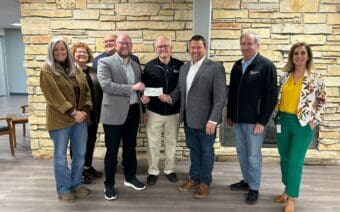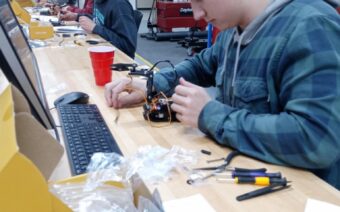
June 1, 2023
SHAWANO – Last month, hundreds of Northeast Wisconsin Technical College (NWTC) students from campuses and centers throughout the region gathered at the Resch Center with friends and family to celebrate their graduation.
Four of those students – Ashlee Corn, Alamea Pyawasay, Pearson Denny and Mariah Fish – graduated from Menominee Indian High School two weeks before and found themselves walking the stage again – this time, receiving their associate’s degree.
Corn, Pyawasay, Denny and Fish were a part of NWTC’s Shawano’s 4×4 program, which allows students to take four general studies courses, four days a week for four weeks, one at a time.
They were also the first to take part in the technical college’s Associate of Arts (AA) Transfer Program, where students can receive an associate’s degree and transfer to a four-year university, if they so choose, as a junior.
The four are the first high school students in NWTC’s history to graduate with an associate of arts degree.
How it started
The 4×4 program – which Jeannie Otto, regional learning manager at NWTC’s Shawano and Oconto Falls locations, said originally started at the Green Bay campus – became a popular choice for students because of the one-class focus.
Then, she said, Menominee Indian High School reached out.
“They came to us asking if we had a creative solution for their high school students,” she said. “We had the 4×4, and so they started eight students with us in 2014. It was only seniors, but it continued to grow to the point where, three years ago, they incorporated juniors into the program as well.”
Last April, Otto said NWTC received state certification for the new AA degree, which was the perfect storm for the Menominee Indian High School students.
//17bec5072710cda5b8dd81b69f4c6e58.cdn.bubble.io/f1685637358210x482175143738858200/richtext_content.webpJeannie Otto
“(They) were on the perfect pathway to continue last summer taking NWTC courses and be the first ever to graduate with the AA degree from their high school and from NWTC,” she said.
Miranda Schornack, early college manager at NWTC, echoed Otto’s sentiment.
“It’s so profound the first graduates of the Associate of Arts Transfer degree are high school students,” she said.
Otto said Corn, Pyawasay, Denny and Fish would come to the Shawano NWTC campus for class from 8:30-11:30 a.m., have lunch and then attend their high school classes.
“A lot of these classes count for (their) graduation requirements as well,” she said. “So they certainly weren’t having to take double – they were just inserting our classes for the requirements.”
A plethora of benefits
Corn, Pyawasay, Denny and Fish were all able to receive their associate’s degree for free, as Otto and Schornack said it’s important to both Menominee High School and NWTC to provide accessible opportunities for their students.
“They had the full support of their school board from day one,” Otto said. “It was about the school deciding they wanted something more for their students. They carved out the budget dollars they maybe would have spent on instructors to help support this project.”
Schornack said NWTC focuses on providing more opportunities for students to attend that historically have struggled or been unable to due to finances and other factors.
“We’re committed to making things affordable,” she said. “And when we talk about what that means for high school students, it means starting to offer classes their high school teachers can teach, and then costs $0 for the school district.”
Schornack said NWTC’s mission aligned perfectly with the programs.
“It was affordable because, in this case, everything was fully funded,” she said. “It’s flexible because we make sure there’s support for students so they can be successful… (and) lifelong learning – that doesn’t just mean code for later in your life after retirement or something. This is like, ‘you’re a teenager, and you can be pursuing a degree, and we can make it challenging but also rewarding and possible for you.’”
Otto said NWTC’s partnership with other colleges and schools was also important in making the AA degree possible.
“It involves Menominee offering some courses transcribed, Northcentral Technical College offering some courses, the College of Menominee Nation offering courses and we (NWTC) offer the bulk of the courses,” she said. “All four entities were involved in making this work, and that speaks to the partnerships we all have and how important they are to help the student, who really is the one who needs to have these opportunities happen.”
The collaboration, Schornack said, also benefits employers.
“What does that mean then, to be good for both of them – (for the students and good for the industry)?” she said. “It means we better be collaborative.”
The 4×4 and AA programs, Otto said, are also meant to help the community.
//17bec5072710cda5b8dd81b69f4c6e58.cdn.bubble.io/f1685637391075x252961913766168960/richtext_content.webpPictured from left to right are Miranda Schornack, Jodi Tetting, Mariah Fish, Ashlee Corn, Alamea Pyawasay, Pearson Denny and Jeannie Otto. Photo Courtesy of NWTC
“A lot of these students from the 4×4 are now back in their community working with two- and four-year degrees as police officers, educators and nurses,” she said. “And that was the vision… to have them return and work in their community and help fill those positions. They’re saving two years of education expenses, but more importantly, they’re able to assimilate back into their community in good positions.”
First-hand experience
Corn, Pyawasay, Denny and Fish all came to know the program through different circumstances.
Pyawasay and Fish said they had sisters who went through the 4×4 program, while Corn and Denny said the program and its challenges seemed appealing.
“Our mentor at our high school approached me at the end of my sophomore year and asked me if I was interested in taking college classes,” Corn said. “I thought it would be a cool experience and a challenge.”
All four said they started taking dual-credit courses in their junior year of high school.
The main courses covered English, math and science, while the rest of the classes were electives.
Pyawasay said the classes helped to “open our minds to college.”
“Having that variety of all the classes helped me pick what I wanted to go to school for,” she said. “So I liked having that.”
While the programs were made to fit into the student’s high school schedule, Corn said managing college-level courses was still challenging.
“I feel like it was difficult because most of us played sports,” she said. “So, we had to manage our homework when we had games. It was a lot of time management and trying to figure it all out.”
The four students said they all knew they wanted to go to college before enrolling but said the 4×4 and AA programs helped pave a clearer path on what they wanted to pursue.
“I was not sure what I wanted to do at all,” Fish said. “I didn’t know how many options we had, and I liked that 4×4 gave us all these different kinds of classes. It helped with picking what I wanted to do.”
Denny said he found out he enjoyed the 4×4 class structure better than the typical high school schedule.
“It was way different,” he said. “And I liked that I didn’t have to go (to class) every day for one hour.”
The program being free was also a huge plus, the four collectively said.
“If I were to have to pay for it, I would not think I would be able to get my associate’s degree,” Pyawasay said. “Being able to take certain classes and not having to worry about how I’m financially going to prepare felt good.”
The future
Looking toward the next step in their academic careers, all four students said they have already committed to a four-year university.
Denny said, while he is still unsure of what he would like to pursue when he goes to the University of Wisconsin-Stevens Point, he hopes to work in a larger city when he graduates.
Pyawasay has committed to the University of Wisconsin-Madison where she plans to obtain a master’s degree in psychology, eventually entering the psychiatry field.
Corn and Fish will both be attending Haskell Indian Nations University in Lawrence, Kansas.
“I plan on playing volleyball there,” Corn said. “I’m not exactly sure what I want to major in yet, but I have a couple of ideas.”
Corn’s future roommate, Fish, said she will be playing on the basketball team.
“I’m leaning toward social work when I get (to Haskell),” she said.
Corn, Pyawasay, Denny and Fish said they all hope high school students continue with the 4×4 program, and gave some words of advice.
“I would say take the opportunity because it puts all of us a step ahead,” Fish said. “It’s great to have at our school, and not only gave us skills for education but gave us life skills, too.”
Schornack said NWTC is also looking at the future of the 4×4 program.
“It was fortuitous these students had started a dual-credit pathway early on,” she said. “So now, we’re looking at – since it’s been so successful with the Shawano regional learning center and Menominee Indian High School – how can we replicate that and expand that across our region?”
Schornack said NWTC is already in the pre-planning stages of expansion.
“Who can we pilot with and partner with? How can we map out all the different dual credit opportunities?” she said. “So, we’re looking at expansion.”
Otto said both she and Schornack are “super proud” of Corn, Pyawasay, Denny and Fish.
“We couldn’t be more pleased to have them, and this is the most spectacular thing you could dream up for our students,” she said. “(We’re) very grateful for the opportunity to have this partnership with Menominee Indian High School. (It’s) absolutely wonderful.”
 Oshkosh Celebration of Lights + EAA = Win-win partnership
Oshkosh Celebration of Lights + EAA = Win-win partnership De Pere, Greener Bay Compost team up to fight food waste
De Pere, Greener Bay Compost team up to fight food waste








